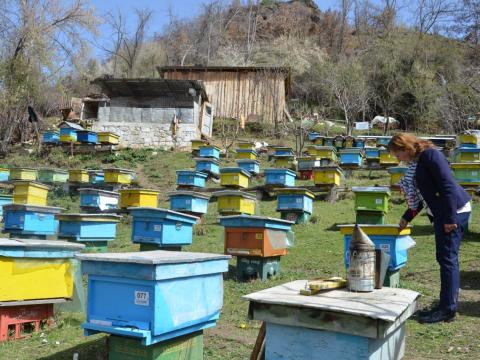Floreta, 'the working bee' that supports her family

Bees are not just a passion for her; they are the daily job, endless care, and a precious heritage from her father. 'Bee’s Park' is a great treasure for Floreta,43-years-old farmer from Librazhd, who has been raised in a bee-keeping household.
After her father passed away, she had to care for the bees on her own. In the beginning she had to confront the mentality in the area, as she is the only female beekeeper there, and then against the numerous challenges to become more acquainted with bee keeping to maintain the family tradition, to assure growth and turn it into a profitable business for the family.
“I inherited the bees from my father, who kept bees for a long time and I used to help him. After my father passed away, the 'Bee Park' passed to me. It was very difficult because I didn’t have any support. My father was the only one who had contacts and knew how to look after bees','Floreta explains.
The need to gain knowledge regarding bees was a necessity. Initially she started searching for information about beekeeping to be better equipped for this sort of farming. ''Then I faced the fact that I was the only female beekeeper in the area. But I decided to retain my father’s tradition. I never surrendered, I bonded closely with the bees and my family turned up to be my greatest support. Even the fact that my husband and I decided to live in my parents' home after marriage, was a done with a purpose to not abandon the bees,” Floreta shares.
Her day starts and finishes with one highlight: care for the bees. Her mother, her husband, and her 18-years-old daughter contribute together for the beekeeping. Similar to 'united' bees, their little family unites to build the wax frames for the bees, harvest the honey and relocate the bees for their migration.
Today, thanks to Floreta's tireless work, the 'Bee Park' inherited from her father with 20 hives counts 150 of them. Floreta tell that in her long road of growing her farm, an important contribution came from World Vision, which has been helping the area farmers in the framework of rural economic development programmes for years.
“I had a chance to know World Vision a few years ago when new farmers were being identified to be supported in their activities in our villages. We established the Business Committee and joined for the common good of our work. Thanks to World Vision I have acquired more knowledge and more experience regarding bees. I have been supported with training, with the new centrifuge that helps me harvest the honey, and with bee hives. I have participated in meetings where we exchanged experiences with foreign countries. This helped me to increase my desire and to grow my bee activity,” Floreta tells proudly.
But the growth of the 'Park’s Bees' as a result of increased demand has put her in front of the challenge to preserve honey in the adequate conditions, promote the honey beyond her acquaintances, and get the certificate of her bio product according to the standards. There is no organised market for honey which creates some issues.
“The lack of an organised market constitutes a serious difficulty as we have to look hard to ensure reliable clients. Our area needs a Food Hub. I sell my honey only to individuals that become regular clients. The beekeeping sector needs great attention regarding the product maintenance and even harvest. The time I spend to find a buyer keeps me away from the timely service to the bee healthcare. We need the certification of our bio products so that they are secure and increase our possibilities to further grow our product. If I would be sure on the immediate sale of my product, I would increase further the 'Bee Park'. Securing the sale would give me more time to work on the expansion and improve the quality for the client,” she adds.
Floreta suggests having a Food Hub, which would offer counseling assistance and agricultural inputs and would operate as a center to all local farmers, would facilitate the increase of bee hives in the area and the local honey production.
She is not the only farmer that expresses an interest in a joint market for the bio products of this area, which would help them to preserve, store, certify, or sell their products without risking to waste any extra production of honey.
In this regard, work has started recently in Librazh area to establish a Food Hub, supported by the project “No Drugs, Food Hub. A sustainable development alternative for Librazhd youth and communities”, funded by the European Union and implemented by the Municipality of Librazhd and World Vision Albania.
The project has created farmer groups with 10 members in each administrative unit of Librazhd Municipality, including local structures and experienced farmers. They will work together to identify the most potential farmers and clients in the area to make them part of the Food Hub. The project aims to identify 360 farmers from different production lines across the municipality.
“I believe we compete with quality. Our land and products offer an extraordinary quality. Competing is very good to put an end to those who offer low quality products, they are many unfortunately. The center will evaluate the quality products for the customers,” concludes Floreta, the optimist beekeeper who teaches that working united like the bees we can achieve more.